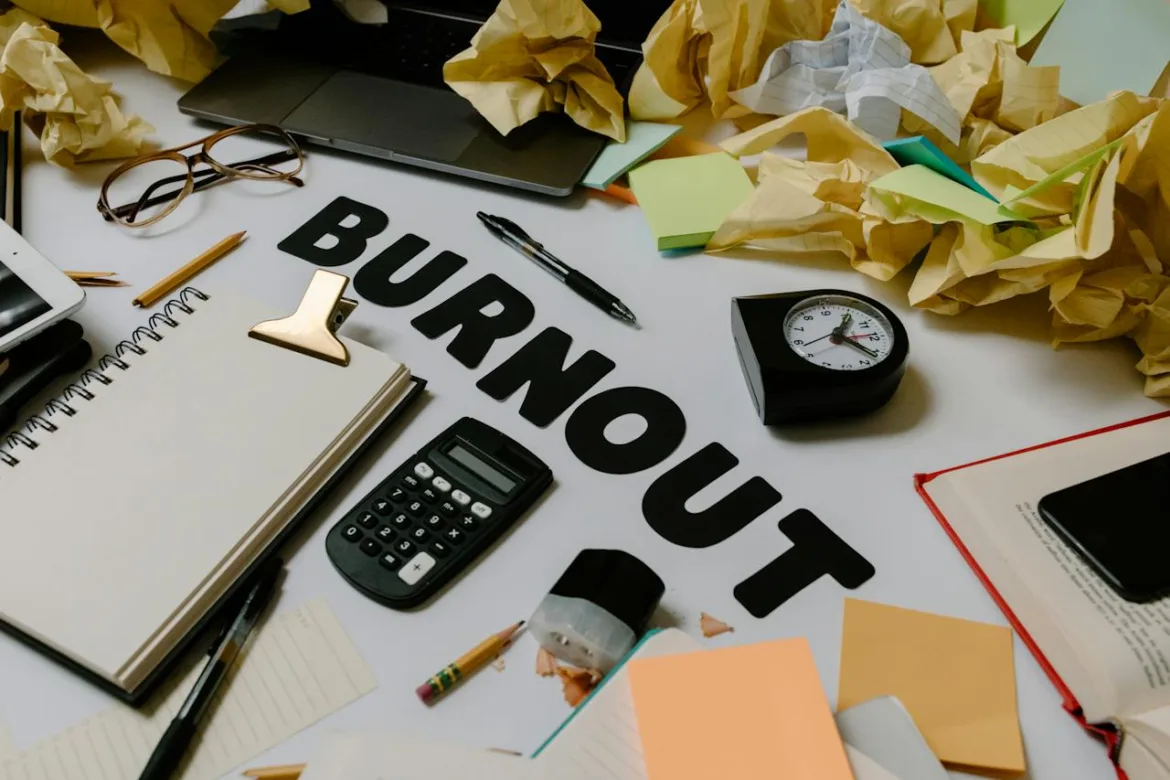Table of Contents
Introduction

Burnout has become increasingly common with many people struggling with prolonged periods of extreme stress from work, caring responsibilities, or life events. The mental health implications of burnout can be significant if left unchecked. Understanding the symptoms, learning prevention strategies, and knowing how to move forward are critical for anyone experiencing burnout.
The Definition and Rising Prevalence of Burnout

Burnout is defined as a state of emotional, mental, and physical exhaustion from excessive and prolonged stress. It occurs when we push ourselves too hard over an extended time while feeling unable to control the stressors in our environment. Burnout can negatively impact every area of life, leading to problematic symptoms like cynicism, reduced productivity at work, overwhelming fatigue, irritability, anxiety, sadness, disconnection from loved ones, substance misuse, and drastic changes in sleep and appetite.
Up to 50% of people may experience burnout during their careers. Unfortunately, many feel uncomfortable disclosing their struggles or lack awareness of constructive solutions. The taboo nature of burnout can perpetuate unnecessary suffering by preventing people from seeking help early. The rise of burnout around the world, especially among healthcare professionals and teachers, reveals an urgency to expand mental health resources and coping outlets when chronic stress snowballs out of control.
How Burnout Can Damage Mental Health

Ignoring escalating stress rarely causes burnout to correct itself without well-planned interventions. Mental health almost always suffers when burnout becomes severe.
Here are some of the common psychological effects:
Increased anxiety, sadness, anger/irritability: As we exhaust our coping reserves, swings in difficult emotions emerge more often while our resilience diminishes.
Trouble concentrating: Both brain fog and racing thoughts might plague your ability to concentrate at work or retain information. Multi-tasking suffers as well.
Sleep disturbances: The anxieties of burnout and fatigue can substantially disrupt sleep quality or cause insomnia.
Lower self-esteem: Being incapable of fulfilling responsibilities or connecting with others can severely damage our self-image when burnt out.
Diminished satisfaction: Hobbies, relationships, job performance, and life, in general, can begin losing meaning, fulfilment, and purpose.
Cynical/pessimistic outlook: Joy, optimism, and positive emotions evaporate.
Loss of motivation: We might abandon healthy lifestyle habits, passions, social outings, and excellence at work due to depleted motivation.
Substance misuse: Some turn toward alcohol, overeating unhealthy foods, or abusing drugs as a coping mechanism.
Suicidal ideation: In extreme burnout, hopelessness reaches dangerous levels, requiring emergency support.
Post-traumatic symptoms: If burnout results from traumatic life events, we might relive pain through flashbacks and severe stress reactions.
These examples reveal why we should all understand the early warning signs of burnout. Letting stress accumulate without relief can mutate into a psychological crisis or breakdown.
Physical Symptoms and Health Risks

In addition to mental health effects, burnout takes a toll physically:
- Chronic fatigue/weakness
- Frequent headaches/migraines
- Digestive issues like cramping or nausea
- Appetite changes leading to weight loss/gain
- Muscle tension, back pain, joint pain
- Frequent minor illnesses from a weakened immune system
- Changes in heart rate, blood pressure, inflammation
When bodily systems remain in overdrive for years, life-threatening diseases can develop over time without intervention. Heart disease, heart attacks, strokes, diabetes, infertility issues, arthritis, and dementia have established connections to prolonged exposure to high-stress hormones like cortisol. Chronic stress essentially primes our physiology for accelerated ageing.
Overcoming Burnout:
Prevention: Building Resilience Before Burnout

Prioritising self-care and maintaining balance might seem impossible when overwhelmed by demanding jobs or life responsibilities—but we must find ways to bolster resilience ahead of burnout. Here are proactive tips:
Define your core values: Stay connected to your identity by clarifying what matters most. Protect time for valued activities.
Set reasonable boundaries: Don’t overcommit yourself. Learn when to say no and delegate tasks to share burdens.
Practice gratitude routines: Appreciate supportive people and little daily joys by journaling or meditative reflection.
Improve sleep hygiene: Follow expert guidance for optimising sleep duration and quality nightly.
Eat nutritious foods: Minimize sugar/caffeine and follow an anti-inflammatory diet high in omega-3’s.
Stay active with exercise: Just 30 minutes daily can boost mood, focus, and relaxation substantially.
Try mindfulness techniques: Yoga, breathwork, and meditation counter stress hormones.
Utilise social support systems: Don’t isolate yourself. Spend time with uplifting friends/family.
Seek counselling or therapy: Having an objective professional helps you process stress.
Fulfill your own needs first: You can’t fill others’ cups when your container is empty. Prioritise self-care.
If you consistently invest time toward restorative activities rather than depleting routines, you reinforce resilience against the toll of stress when critical moments arise.
Coping Strategies for Healing from Burnout

Recovering from burnout’s effects requires tender loving care for your mind and body. Implement a multifaceted self-care plan relying on these coping strategies:
Accept where you currently stand: Be compassionate with imperfections and emotionally fatigued states as you build back strength. Perfectionism will sabotage progress.
Reduce major stressors whenever possible: Temporarily cut back work hours or difficult commitments. Seek support rather than shoulder everything alone.
Practice relaxation techniques: Try calming activities like gentle yoga, music therapy, leisurely nature walks, Epsom salt baths, massage therapy or sipping herbal teas.
Reframe negative thought patterns: Seek positive perspectives when your inner critic gets loud. A counsellor can help with cognitive restructuring.
Revitalise your health foundations: Follow your doctor’s advice while emphasizing restorative sleep, nutrition and movement.
Consider your purpose and passions: Rediscover inspiration by volunteering, enjoying hobbies or prioritizing cherished relationships.
Keep a progress journal: Writing routines help you process stressors and recognize incremental healing.
Enlist a support network: Don’t go it alone. Connect regularly with empathetic, caring people who encourage you.
Additional lifestyle changes like minimising stimulant intake, taking mental health days off from work, or practising meditation might also help you bounce back. Healing happens gradually, not overnight. With commitment to reducing demands and nurturing yourself the burnout fog will eventually lift.
Professional Help Options

You don’t have to struggle with burnout’s symptoms solo. Consider engaging mental health professionals for guidance, diagnosis, or structured treatment plans. Start with your primary care physician for referrals.
Counselling and psychotherapy provide spaces to overcome negative thought cycles and develop coping skills. Cognitive behavioural therapists specialise in goal-setting while addressing distorted thinking patterns that hold people back. Psychologists and clinical social workers can also diagnose mental health conditions related to burnout for serious intervention.
Medications might help stabilise mood, anxiety, focus, sleep deprivation or chronic stress symptoms temporarily while counselling teaches long-term coping techniques. Antidepressants or sleep aids prove useful for some recovering from high burnout.
Alternative medicine offers additional avenues worth exploring. Acupuncture, hypnotherapy, life coaches, occupational therapy, light therapy, art therapy, spiritual guidance and massage might facilitate well-being.
Seeking multifaceted treatment establishes accountability while determining what combination of lifestyle changes and clinical support serves you best.
Prioritise Self-Care to Overcome Burnout’s Effects

Burnout might drain mental health and stall life’s joys—but we all have the power to alter its course through resilient thinking, dedicated self-care, support networks and professional assistance if necessary.
Key proactive habits like boundary setting, stress relief practices, positive relationships, balanced nutrition, quality sleep and purposeful living go a long way when stress exceeds reasonable limits. Check-in often about how you’re coping.
With tender loving care for your mind, body and spiritual self, recovery from burnout empowers you to create sustainable wellness rather than living on the edge of emotional crisis. Relief takes time and daily upkeep—but doing so is well worth reclaiming your energy and sense of meaning.

FAQs
What are some of the early warning signs of burnout?
Early signs include feeling exhausted all the time, increased cynicism or negativity, lack of productivity and effectiveness, feeling disillusioned about your job or responsibilities, having problems sleeping, and feeling helpless or resentful related to responsibilities.
Why can burnout increase the risk of serious physical health issues over time?
When we’re burnt out, our bodies suffer from prolonged activation of stress hormones and physiological systems straining to meet the demands placed on them. This puts us at higher risk for inflammation, heart disease, impaired immunity, headaches, severe fatigue, and other effects.
What type of boundaries should you set to avoid taking on too many responsibilities when you’re already overwhelmed?
Learn to say “no” to non-essential tasks and any commitments that would stretch your limits too thin. Delegate when possible. Take regular breaks to rest and refuel. Set cutoff times in the evening for work responsibilities. Protect time for family, hobbies, and self-care activities.
What relaxation techniques might help cope with some of the mental strain of burnout?
Options like yoga, meditation, music or art therapy, spending time outdoors in nature, massage, aromatherapy, or engaging in enjoyable hobbies can activate our relaxation response to counter burned-out feelings.
How can seeking professional support assist in recovering from burnout?
Counsellors help develop healthy coping strategies tailored to your unique situation. Therapists diagnose accompanying mental health issues that may emerge. Doctors can rule out underlying factors and refer you to help resources. Support groups reduce isolation. Alternative medicine provides additional outlets like acupuncture, life coaches, or occupational therapy.



